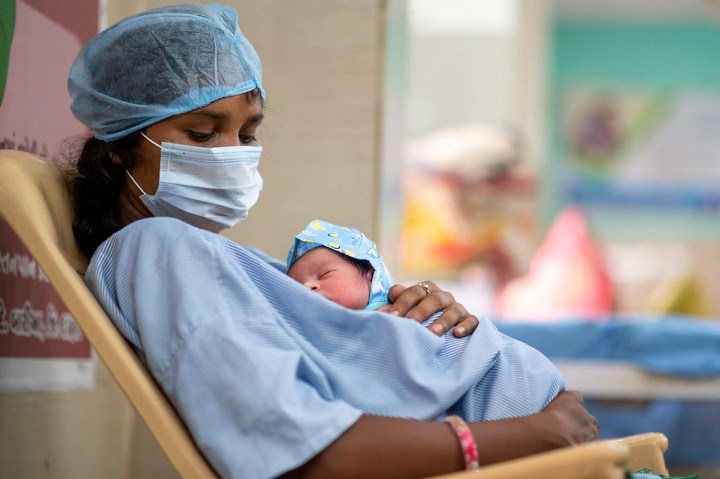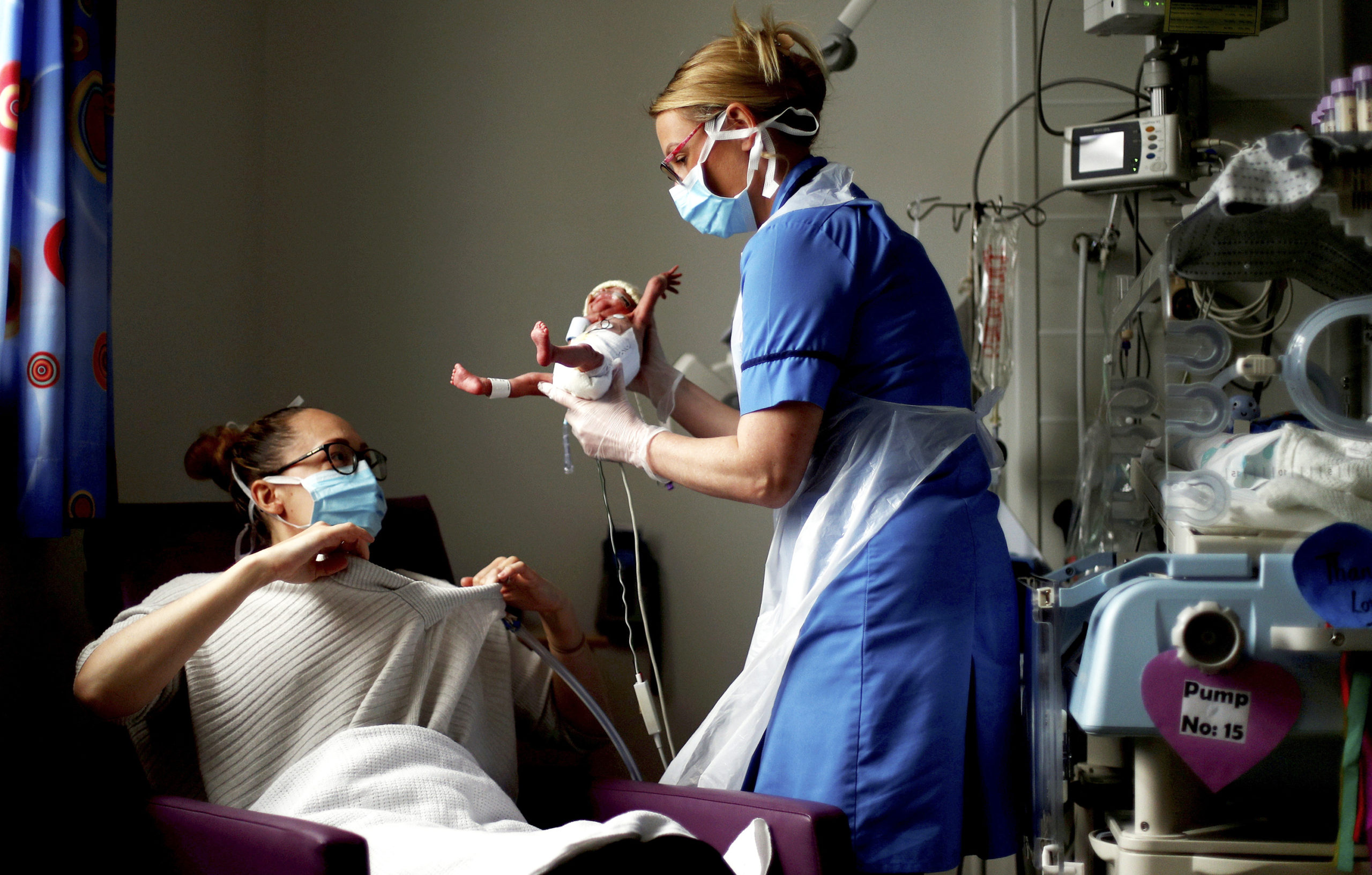LOCKDOWN BABIES
The women navigating pregnancy, birth and motherhood during the Covid-19 pandemic

A South African study highlights the experiences of parents navigating birth and postpartum care during Covid-19.
First published in the Daily Maverick 168 weekly newspaper.
“Our hope was to be able to rapidly document the experiences of new parents whose babies had been born in the Covid-19 context.
“We wanted to understand what the impact of Covid-19 and the lockdown regulations had been, and where women were drawing support from … to create awareness of these issues and inform possible support options for new parents,” explains Tamsin Phillips, a senior lecturer in the epidemiology and biostatistics division in the School of Public Health and Family Medicine at the University of Cape Town (UCT).
Phillips says the research was sparked by the personal experiences and passions of each member of the team. “Elise Farley is an epidemiologist by training, and her baby was born a few days before the first lockdown in 2020. Going through this experience, she immediately wanted to explore more systematically the experiences of new parents during this time.
“She reached out to Emma Numanoglu, who is [a] registered nurse, a midwife and lactation specialist in private practice, as well as Amanda Edwards and me as we both have research interests in maternal and child health, and we developed the survey.”
The study covered 496 women, most of whom gave birth in private hospitals between 1 January and 1 October 2020.
When Covid-19 began, it was unclear whether pregnant women and newborns would be at an increased risk of infection. The World Health Organization and global health departments responded to this uncertainty by regularly releasing guidelines for maternal and neonatal care.
Hospital and medical guidelines affected the experiences of expectant parents. In some instances, this resulted in shorter stays in hospital, the limited ability of birth partners to attend antenatal consultations, limited access to services as well as restricting birth partners to short visits after delivery.
Added to the challenges to their antenatal care, expectant parents had to navigate lockdown regulations that made their movement and the buying of essential baby care items more difficult.
A British study found that “lockdown has impacted maternal experiences, resulting in distress for many women”.

The Covid lockdown has impacted maternal experiences. (Photo: weform.org / Reuters / Hannah McKay / Pool / File / Wikipedia)
The same was true for many South African parents when, for example, the initial March 2020 regulations under the Disaster Management Act did not include items for baby care as essential items, making it illegal to sell vital products such as baby clothes, nappies and teething gel. This was corrected after court action from two non-governmental organisations.
“While overall in this study we found that women were incredibly resilient to both the usual challenges of delivery and parenthood and the added Covid-19 and lockdown challenges, feelings of disconnection and isolation during lockdown were common and appeared to impact negatively on their experiences,” says Phillips.
The SA study shows that most mothers who gave birth during lockdown reported that the pandemic had affected their birth experience (78%). Two in 10 mothers who gave birth after the lockdown was announced had a negative birth experience (23%) compared to just 4% before lockdown.
The main reasons for those negative experiences included a traumatic experience, feeling disconnected from what was happening and not having a partner at the birth.
The study also found that mothers of babies born before lockdown were more likely to have had their preferred method of birth (65%) than those who gave birth in Level 4 (55%), Level 3 (58%) and Level 2 (58%).
Numanoglu, one of the study’s co-authors, says there are a few possible reasons, many of which relate to changing hospital practice around allowing birth partners into the birthing room to avoid increased risk of Covid-19 infection. During the pandemic, medical facilities rapidly adjusted their practices to protect their staff and patients.
“Some mums felt more comfortable choosing a C-section when they were not previously thinking of this option, as then they would have a set date and could plan around getting the [Covid-19] test and isolating. Partners really did not want to miss the birth, which was a possibility with all the policies around Covid testing prior.
“Another possible reason is many mums that had chosen to have a doula with them were suddenly told they could not bring doulas in with them, and this caused a lot of anxiety as they were planning to have that support,” says Numanoglu.
This need to change plans may be linked to the findings in the study indicating high rates of C-section among mothers in the group (63%). “The experiences of birth and early parenting can have a lasting impact on the child and on parent mental wellbeing,” says Phillips. “There is evidence that parents’ perceived negative birth experiences are associated with symptoms of post-traumatic stress in the mother, and we also know that parental mental health can have long-lasting impacts on the child’s behavioural and emotional state.”
The SA findings mirror those from the UK, Australia and elsewhere, which indicated that mothers of lockdown babies said the lockdown had contributed to feelings of anxiety, depression, isolation and loneliness.
“Particularly in this more isolated time, new mothers need to feel like they are not alone if they are struggling,” says Phillips.
Yet despite global evidence that Covid-19 and the lockdown placed strain on mothers’ mental health, few women in the South African study sought mental health support, even though more than 60% showed signs of minor depression.
The authors suggest that “depression screenings should be a routine part of postnatal check-ups – just as important as checking stitches or monitoring blood pressure”.
Access to mental health support in South Africa is challenging. This is linked to constrained human resources spread out across a large population and concentrated in urban centres. For Phillips, digital platforms present an opportunity for greater reach.
“While there are support services available and particularly digital support options have become more prevalent during the pandemic, I think many women are not aware of these options and there remains a lot of stigma around accessing mental health support.” DM168
This story first appeared in our weekly Daily Maverick 168 newspaper which is available for R25 at Pick n Pay, Exclusive Books and airport bookstores. For your nearest stockist, please click here.
"Information pertaining to Covid-19, vaccines, how to control the spread of the virus and potential treatments is ever-changing. Under the South African Disaster Management Act Regulation 11(5)(c) it is prohibited to publish information through any medium with the intention to deceive people on government measures to address COVID-19. We are therefore disabling the comment section on this article in order to protect both the commenting member and ourselves from potential liability. Should you have additional information that you think we should know, please email [email protected]"






 Become an Insider
Become an Insider